
Wonderful and unique. You know those scenes in cartoons when a guy gets kissed by a girl and his face turns red and steam shoots out of his ears and he hops around and makes a "heart-shaped cloud" in the air? This movie is kinda like that.
There's nothing like a P.T.A. film. For all the talk of his style being similar to Scorsese's or Altman's or whomever, no films play remotely the way Anderson's do. His is a unique tone, achieved through radical use of sound and editing, and canny framing and lighting. You'd think such a master technician would treat the actors like props, but if anything, Punch-Drunk Love will cement Anderson's reputation as a director who brings out great performances, heretofore buried, within his actors.
I don't have near enough time to describe everything I liked about the film, but some of my favorite scenes were:
• Barry confessing to the dentist husband of one of his sisters that he doesn't like himself very much, and wants to know what's wrong with him. Anderson's trademark collision of humor and sadness.
• Barry leaves the table to destroy the men's room after assuming his sister has told Lena the worst about him. The rage, the hurt, the love... it's terrifying and exhilarating.
• The pillow talk between Barry and Lena. "I love you so much I want to smash your face in..." (or something like that.) Barry's a soul-cousin to the former quiz kid from Magnolia who's "got a lot of love to give," and to Claudia Gator, who's been burned every time she's reached out, and has walled herself off the world, but now the light comes in, and it scares her.
• The entire "He needs me" sequence, culminating in the silhouette kiss, with the necks making a heart (which left tears dribbling down my cheeks). The way the telephone (and the town) lit up when Lena answered the phone.

Not only is this the funniest film of the year, but it's also unexpectedly moving. Adaptation refers not just to the process of translating a book into a screenplay, but achieving personal growth through pursuing one's passion. It's a hilarious and scary foray into the mind of Charlie Kaufman, as directed by Spike Jonze, who manages to reign in the script's excesses while honing its emotional undercurrent. The cast is uniformly excellent--Cage ought to win two Oscars for his performance as Charlie and Donald Kaufman. With no change in prosthetics, he manages to create two distinct characters, believable as brothers, solely through gestures, posture, facial expression and vocal inflection--you know, acting! Chris Cooper is no less superb as the toothless but still sexy Renaissance man orchid thief, and Meryl Streep shines in an all-too-rare comedic role.
There are many who have problems with the film's ending, but I'm not one of them. Not only is the ending obviously where the film should be going, if you've paid attention, but it's tonally ingenious in sliding almost imperceptibly into a weird mix of banality and inspiration. The best films should throw you off-balance and make you question what it is you like about them (and movies in general). Adaptation demonstrates the potential for art in entertainment by breaking all the rules, and then proceeding to show how effective those rules are when used intelligently.
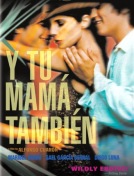
Everything about this film is right, from the largest topics (sexual politics, gender politics, generational politics and just plain old politics) to the small details (the way the fisherman Chuy is humanized in expedient, poetic scenes that a more cynical movie would have changed--he'd probably kill the threesome and take all their money; also, the scene at the restaurant which ends with a traveling shot to the backroom where an old lady is doing this funny dance and the others are washing dishes).
This film teems with life and does not feel hermetically sealed off from the world. Y tu mamá también's refrain is what people choose not to share with others (whether it's a childhood incident that only holds personal significance, or a secret that might ruin a friendship). What the film shares with us is how growing up can mean growing apart.
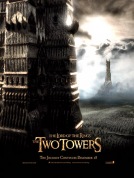
Perhaps the thing I like best about Tolkien's trilogy is the way the back-story is omnipresent, yet never fully explained. It makes his fantastic, unreal world seem real. Peter Jackson and crew have accomplished the same thing with the first two films of the series. The sets, costumes, geography, language, etc. all serve to create a believable world. This is key because it makes this more than just a fantasy film. The stakes seem higher because I'm not dealing with a flimsy two-dimensional speculation, but an authentic history with real consequences. And it would still risk being turgid if not for Jackson's thrilling camera movements, his sense of when to blast you with a close-up and when to dizzy you with a awesome long shot.
There are two elements particular to The Two Towers that are worth singling out. One is the emergence of Viggo Mortenson's Aragorn as an epic hero worthy of such a great tale and the time (what a beautifully patient character arc!) it takes to tell it. The other is the pathos of the unfortunate creature Gollum, a remarkable creation and a counter to the charges that Tolkien's world is one of stark good and evil.
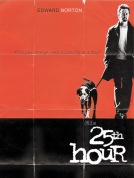
Spike Lee's best film since Do the Right Thing. I've waited patiently for Lee to knock another one out of the park, and he puts it all together here in this study of loss and responsibility in present-day New York City. What makes the film special is its audacity and go-for-broke style. 25th Hour risks losing you from its first sound, of an injured dog yelping over the studio credits, through its early scenes, which are suffused with a melancholy and painfulness (and accompanied by a glorious, bombastic score from Terence Blanchard) that seems premature. But it is a promise that is fulfilled, and by film's end, I found myself tremendously moved. Scenes that would be filler in another movie, Edward Norton walking down a boardwalk, or a conversation between Philip Seymour Hoffman and Barry Pepper (all three actors are phenomenal here) are charged with energy by unconventional editing and camera angles that keep you on your toes. It's a way of evoking a state of mind, feeling the thoughts and emotions of a man in his last day of freedom, as well as those of his friends and family. As such, the experience is manifold; I tasted elation, despair, laughter, anger, regret... a life in the day of Monty Brogan & co.
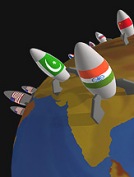
An anti-nuclear, anti-nationalist documentary that invokes and captures the spirit of Mahatma Gandhi. This Indian film concerns the nuclear saber-rattling that has been going on between India and Pakistan, and its fallout on the citizens of both countries. Patwardhan shows how the governments of both countries are defying the will of the people to secure power for themselves. It's a passionate, intelligent and angry film that deserves more than a festival release, but apparently has run into censorship issues in India.
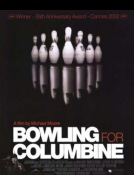
7. Bowling for Columbine
Bowling for Columbine probably isn't the best movie out there, but I sure wish it played on all the networks with no commercial interruptions one night. Michael Moore returns to form (after the book tour disguised as a documentary called The Big One) with a movie that should generate discussion. It's hugely ambitious, and admits that it falls short of providing answers to its large question "why is the United States so violent?", but it's a provocative and eye-opening ride with equal parts humor, sadness and anger. There are a few flubs--one of the film's most powerful sequences is marred by the facile irony of the Louie Armstrong song "What a Wonderful World," and Moore occasionally tries to be too cute with his voice-over and editing--but this is an important piece of polemical filmmaking.
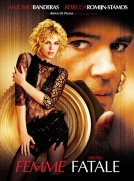
8. Femme Fatale
De Palma has run hot and cold for me, but he is on fire here. It's a given that he displays technical mastery and that his film will look and sound terrific, but what surprised me most about Femme Fatale was that it was not an empty exercise in style (as many critics have obtusely claimed). Admittedly, it didn't hit me until the final shot, a collage of photographs taken by Nicolas Bardot (Antonio Banderas). Femme Fatale is a collage of De Palma's obsessions, both stylistic and thematic, which, when placed next to each other reveal a big picture. De Palma has made a pastiche of his career as a pastiche filmmaker, and Femme Fatale is about creating something new out of the hoary. It's simultaneously an exciting, sexy thriller and rebuke of the ridiculousness and unreality of thrillers. It is exceedingly difficult to have one's cake and eat it too, but I think this is an example of just that.

9. Pulse
Deeply weird and unsettling, Pulse (a.k.a. Kairo) is further proof that Kiyoshi Kurosawa is one of the most original talents working in cinema today. The story is hard to sum up, and the ideas difficult to convey (without a second viewing and/or a full-length review). Let me just say that it's a ghost story. Ghosts, I realized, are scary not because they remind us of death, but because they tell us that death isn't an existence of happiness and reuniting with other passed away relatives and friends. Death is an extension of the loneliness we already feel. Pulse taps into the dread of eternal isolation.

10. Talk to Her
A complex and morally challenging melodrama from Pedro Almodóvar that is nearly as satisfying as his great All About My Mother. The highlight is the silent film within the film, a masterful allusion to the rape which we never see onscreen. Somehow Almodóvar (and his fine actors Javier Camera and Dario Grandinetti) kept me emotionally involved, despite what would normally be described as sick, psychopathic behavior.
 Year
in Review Index
Year
in Review Index